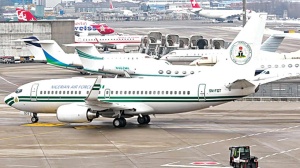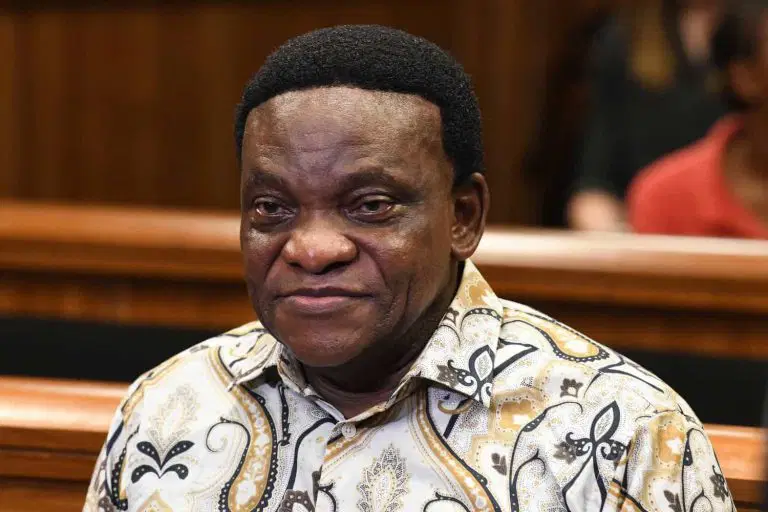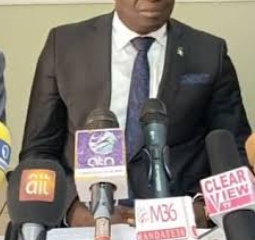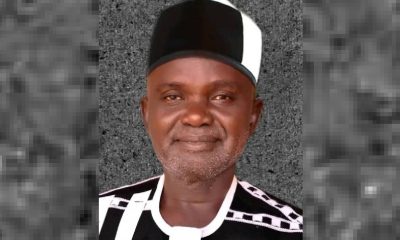News
Cost of governance: Tinubu orders sale of three presidential jets

Three jets in the Presidential Air Fleet (PAF) are to be sold off, it was learnt at the weekend.
This is part of the cost-saving measures being adopted by the Tinubu Administration, an official revealed.
There are 10 aircraft in the fleet – six jets and four helicopters – which will be cut to seven if the planned action sails through.
During the administration of President Muhammadu Buhari, the plan to sell two planes in the fleet did not materialise.
In October 2016, a Dassault Falcon 7x executive jet and a Beechcraft Hawker 4000 business jet were put up for sale.
The preferred bidders who initially agreed to pay $ 24 million for the two aircraft, later reduced their offer to $ 11 million. This was rejected by the then government.
Thereafter, an arrangement to put some of the aircraft on chatter for willing governors was initiated to make the planes income-generating, thereby reducing the government expenses on maintenance.
The planes in the Presidential Fleet are Boeing Business Jets (BBJ) 737, Gulfstream G550, Gulfstream G500, two Falcon 7X, HS 4000, two Agusta 139, and two Agusta 101.
The BBJ 737 is the Nigerian Air Force One, which is used exclusively by the President.
It is designed to serve as an office and a residential quarter on air to enable the president to function effectively during his trip.
The President also uses one of the helicopters for shuttles during his trips around the country.
Other jets in the fleet are used by top government officials, including the Vice President, governors, the President of the Senate, the Speaker of the House of Representatives, the National Assembly members on special shuttles, the Secretary to the Government of the Federation, ministers on special missions, the Chief of Staff, advisers and even ambassadors of plenipotentiary status.
It could not be ascertained at the weekend if the President BBJ 737 will be sold and replaced.
The BBJ was bought for about $43 million during the administration of President Olusegun Obasanjo.
A Falcon and Embraer jets have been slated to be sold.
Not less than N80 billion has been budgeted for the PAF as maintenance cost, as follows: 2016 (N3.65 billion), 2017 (N4.37 billion), 2018 (N7.26 billion), 2019 (N7.30 billion), 2020 (N6.79 billion), 2021 (N12.55 billion), 2022 (N12.48 billion) and in 2023 about N25.7billion, made up of N13billion in the budget and N12.7billion in the 2023 Supplementary Budget.
The amount released from the budgetary line year on year could not be confirmed.
But President Tinubu is said to be uncomfortable with the rising cost of maintenance, hence his directive to reduce the fleet.
A top source, who spoke in confidence, said: “The President is uncomfortable with the rising cost of maintaining the planes.
“Three planes have been pencilled down for disposal.
“The main reason is cutting down high maintenance costs.
“I think officers in PAF were particularly concerned about the frequency of maintenance and how much it costs the nation.
“The President decided to let off the aircraft that constitute the most burdensome.”
An investigation confirmed that the presidency might have incurred over $5 million as maintenance fees in the past few months.
It was unclear the actual figure of outstanding commitments on the fleet which have not been settled.
Giving reasons for the use of some of the planes by top government officials, a source said: “It takes much time to connect some African countries by air. In such a situation, the Presidential Air Fleet is handy.
“The use of the fleet is domiciled in the Office of the National Security Adviser (ONSA) for effective management.”
Last week, President Tinubu in another cost-saving measure imposed a three-month travel ban on public-funded foreign trips by Federal Government officials.
News
Nigerian Immigration Operatives Nab 51 Illegal Migrants From Mali In Nyanya, Abuja

According to the statement, the arrests took place on Monday, March 31, 2025, following credible intelligence.
The Nigeria Immigration Service (NIS) has said that its officers arrested 51 illegal migrants from Mali in New Nyanya, Karu Local Government Area of Nasarawa State.
The NIS made this known in a statement issued on Wednesday by its Public Relations Officer, ACI A.S. Akinlabi.
According to the statement, the arrests took place on Monday, March 31, 2025, following credible intelligence.
A breakdown of the arrested migrants revealed that 11 were female, while 40 were male, with ages ranging between 16 and 19 years.
Akinlabi stated that preliminary investigations revealed that the arrested illegal migrants may have been victims of Trafficking in Persons (TIP) and Smuggling of Migrants (SOM), as they were found without valid travel documents or residence permits.
“Preliminary investigations conducted by the Service suggest that the migrants may have been victims of Trafficking in Persons (TIP) and Smuggling of Migrants (SOM), as they were found without valid travel documents or residence permits,” Akinlabi stated.
The statement further noted that the detained individuals have been taken into the custody of the Service for further profiling and investigation.
“The arrested individuals have been taken into the custody of the Service for further profiling and investigation to determine the circumstances of their migration and any potential involvement of trafficking or smuggling networks or syndicates,” Akinlabi added.
Akinlabi further stated that the NIS would determine the circumstances surrounding their migration and uncover any potential involvement of trafficking or smuggling syndicates.
The statement added, “The Nigeria Immigration Service remains committed to ensuring that Nigeria’s borders are protected against illegal migration while upholding the rights of migrants who comply with the country’s immigration laws.
“The Service continues to work closely with relevant authorities and stakeholders to combat smuggling of migrants and counter trafficking in persons effectively.
“The NIS reassures the general public of its unwavering commitment to National Security and Migration Management while encouraging citizens to report suspicious migration activities to the nearest NIS Commands and Formations.”
News
Police Exhume Engineer’s Body From Shallow Grave In Delta Community

The remains of an engineer, Chigozie Udalu, have been exhumed from a shallow grave in Akwukwu-Igbo, the headquarters of Oshimili North Local Government Area in Delta State.
Recall that the engineer, who was contracted to construct offices in Akwukwu-Igbo, was murdered and buried in a shallow grave.
Though the incident occurred in December 2024, details only emerged recently after two suspects were arrested in connection with the crime.
Assailants Murder Construction Engineer In Delta State Community, Bury In Shallow Grave
A community source revealed that the suspects, identified as Tiv youths from Benue State, allegedly killed the engineer and concealed his body on a farm.
“Two Tiv boys from Benue State have been arrested in connection with the crime. They buried the engineer’s remains in a shallow grave on a farm,” the source stated.
The Delta State Police Command confirmed the incident, with spokesman Edafe Bright acknowledging that an investigation was ongoing.
“We are aware of the incident, and our men are working to ensure others involved are apprehended,” Bright revealed.
On Wednesday, the remains of the victim were exhumed by the police and the Delta State government.
A police source revealed that the arrested suspects alleged the engineer owed them money and often verbally abused them.
“They had also intended to steal cement from the site but perceived the engineer as an obstacle. On December 10, 2024, they planned to strike him with a 2×2 plank but assumed he was physically strong and might overpower them.
“On December 11, the Tiv boys put a rope around his neck from behind, causing strangulation. Upon his death, they buried him in a shallow grave on the farm,” the source explained.
“Following the murder, the suspects reportedly completed their contract at the site and stole the victim’s phone, making several attempts to transfer money via a mobile app.
“Additionally, the landlord of the construction site was accused of being involved in money rituals. In an attempt to clear his name, he was taken to shrines to swear an oath before the victim’s family.
“The landlord recounted his ordeal, stating that he nearly gave up on the case due to the challenges he faced with the State Criminal Investigation Department (SCID) in Asaba.
“However, a police officer suggested he visit Ekpan Divisional Police Officer (DPO), CSP Aliyu Shaba. The officer assured him that within 30 days, the truth would be uncovered.
“Upon arrival at Ekpan, the landlord briefed the DPO, who assembled his team and employed sophisticated investigative techniques, leading to the arrest of two suspects.
“One of the suspects later confessed to knowing the location where the engineer was buried,” the source said.
A young man was also arrested and transferred to the SCID for openly threatening the victim in the presence of the landlord, further highlighting the brutality of the crime.
Of the four individuals arrested, two are considered principal suspects. Meanwhile, a manhunt is ongoing for the remaining suspects who are still at large.
News
S/African Court Acquits Nigerian Pastor Of Rape, 31 Other Charges

A South African court found a Nigerian televangelist not guilty on 32 charges Wednesday, eight years after he was jailed on accusations of raping and sexually assaulting several young women from his church.
Eastern Cape High Court judge Irma Schoeman said the prosecution had mishandled its case against Tim Omotoso, 66, senior pastor at the Jesus Dominion International (JDI) church based in South Africa.
Omotoso, arrested in 2017, fell to his knees and appeared to pray after the judge found him not guilty of all charges, which included sexual exploitation and human trafficking.
Schoeman said that while the pastor’s explanations appeared improbable, state prosecutors had not proved beyond reasonable doubt their case against him and two assistants who also faced charges.
“The accused are found not guilty and are discharged on all the charges,” she ruled.
The women who testified against Omotoso said they were handpicked by the pastor, who would pray for forgiveness after each encounter with them.
Some had been part of a gospel girl band called Grace Galaxy set up by the pastor and others were still at school, the judge said.
With South Africa battling high rates of rape and abuse of women and children, dozens of women picketed outside the court in the eastern coastal city of Gqeberha as the verdict was being read out.
Thousands of people rallied in several cities on Tuesday to demand that authorities take action after a seven-year-old girl was allegedly raped at her school last year. There have been no arrests.
According to police figures, 42,500 rapes were reported in South Africa in the financial year 2023-24.
AFP
-

 News17 hours ago
News17 hours agoTinubu Sacks NNPC Board, Appoints New Leadership
-

 News17 hours ago
News17 hours agoHe came to propose to me, and died in my hostel
-

 News10 hours ago
News10 hours agoVideo: Watch Dr Nwambu of CCLCA analyse ex-River HoS allegations against suspended Gov Fubara
-

 News16 hours ago
News16 hours agoAkpabio, Yahaya Bello Conspired To Assassinate Me – Senator Natasha Makes Fresh Allegation
-

 Business5 hours ago
Business5 hours agoBank stops transfer fees on online transactions
-

 Sports16 hours ago
Sports16 hours agoSuper Eagles Must Defeat South Africa to qualify for 2026 World – Eric Chelle
-

 Sports17 hours ago
Sports17 hours agoSaka scores as Arsenal beat Fulham to close gap on Liverpool
-

 News16 hours ago
News16 hours agoWike sympathies with Ortom over younger brother’s death






